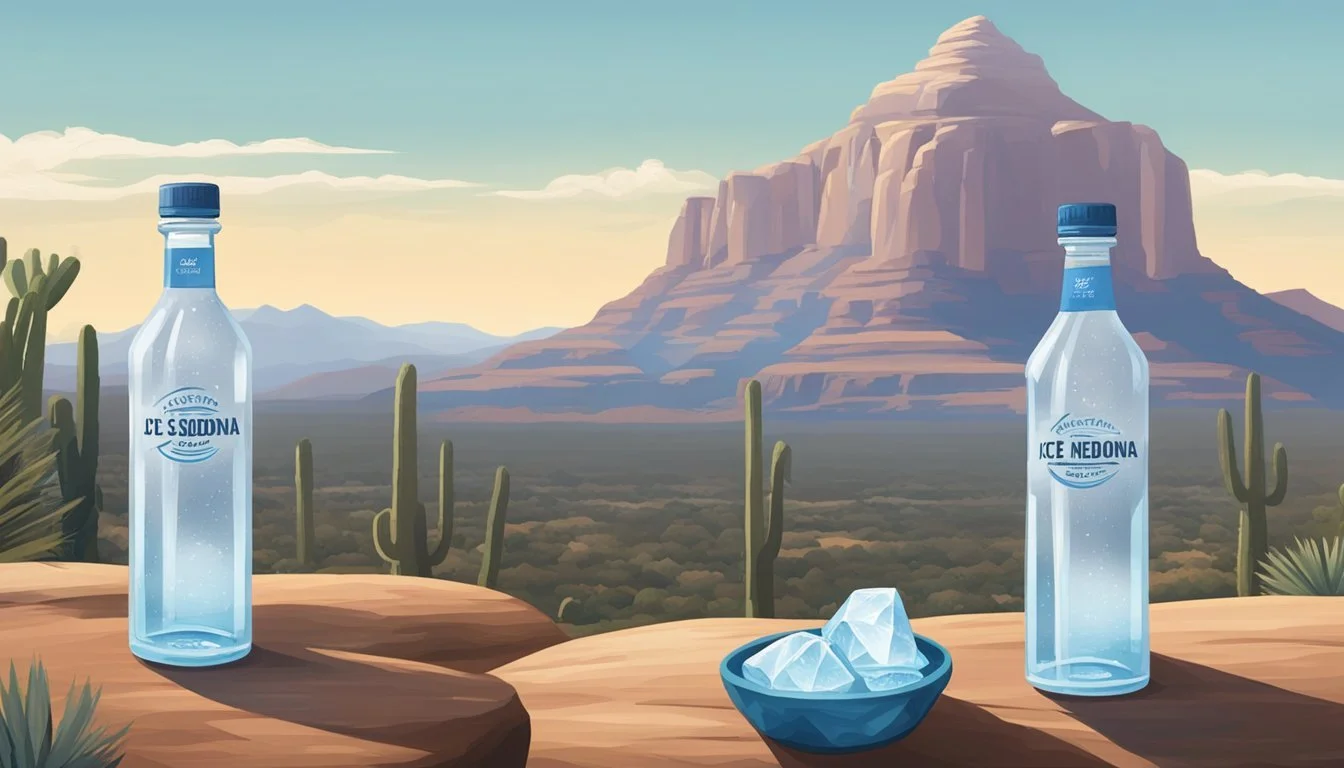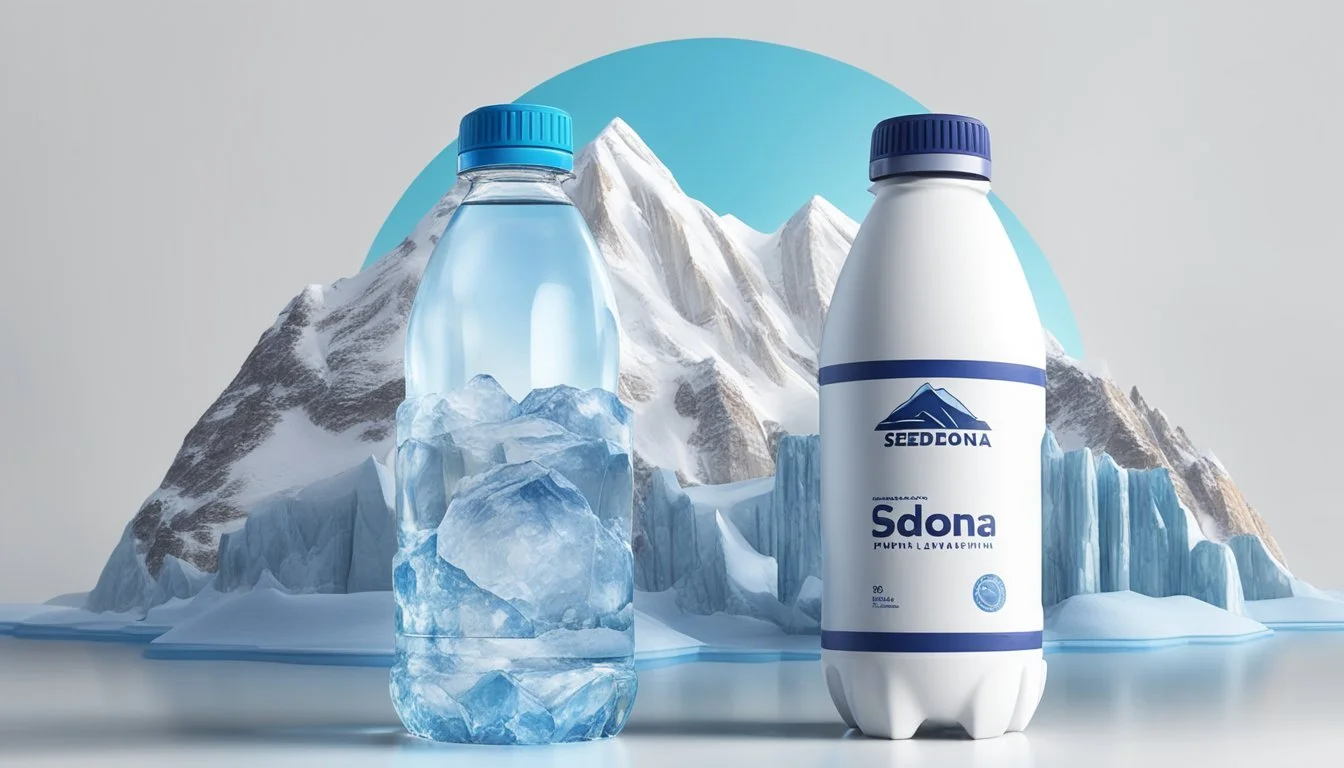Ice Mountain vs. Purely Sedona
An In-Depth Comparison of Bottled Water Quality
In the bustling market of bottled water, two brands often catch the discerning consumer's eye: Ice Mountain and Purely Sedona. Each promises purity and a refreshing taste, but their sources and characteristics show some notable differences. Ice Mountain, known for its affordability and wide availability, touts its natural spring water origins, while Purely Sedona offers the allure of artisanal spring water from the iconic red rocks of Sedona, Arizona.
Ice Mountain provides an accessible and consistent option for hydration. Its affordability makes it a staple in many households, appealing to those who prioritize cost-efficiency without compromising on quality. On the other hand, Purely Sedona appeals to those searching for a more unique drinking experience, with water sourced from a distinct and picturesque environment.
For those navigating the choices in the bottled water aisle, understanding the nuances between these two brands can make all the difference. Whether seeking the familiar reliability of Ice Mountain or the unique charm of Purely Sedona, consumers are sure to find a suitable option to quench their thirst.
Understanding Bottled Water
Bottled water comes in various types, each with distinct characteristics and health implications. Evaluating these factors helps consumers make informed choices about what they drink.
Defining Bottled Water and Its Types
Bottled water refers to water packaged in bottles for consumer use, often sourced from natural springs, wells, or purified tap water.
Types of Bottled Water:
Spring Water: Sourced from underground formations and flows naturally to the surface. Examples: Ice Mountain, Mountain Valley.
Purified Water: Water that has undergone processes like distillation, deionization, or reverse osmosis. Examples: Aquafina.
Mineral Water: Contains natural minerals and electrolytes from its source. Examples: Purely Sedona.
Artesian Water: Comes from a well that taps a confined aquifer.
Assessing the Quality of Bottled Water
Quality is determined by the source, filtration, and purification processes.
Key Quality Indicators:
Source: Natural springs or wells are often deemed higher quality.
Filtration and Purification: Processes remove contaminants like lead, arsenic, and microplastics.
Mineral Content: Essential minerals like calcium and magnesium add health value.
Standards set by the FDA and EPA ensure water is safe for consumption by regulating acceptable levels of contaminants.
Health Implications of Bottled Water Consumption
The health benefits and risks of bottled water vary based on its type and purity.
Health Benefits:
Hydration: Adequate hydration is crucial for bodily functions.
Minerals and Electrolytes: Mineral water can provide beneficial nutrients for hydration.
Health Risks:
Contaminants: Despite regulations, some bottled waters may contain harmful substances like heavy metals or microplastics.
Sodium Levels: Some bottled waters have added sodium, which may not be suitable for people on low-sodium diets.
Choosing the right bottled water involves considering these health implications and the quality standards it meets.
Brands in Comparison
Comparing Ice Mountain and Purely Sedona reveals distinct differences in their sources, qualities, and consumer appeal. Each brand offers unique attributes that cater to varying tastes and preferences.
Ice Mountain: Source and Quality
Ice Mountain is part of Nestlé Waters North America's portfolio. It is sourced from springs in Michigan and other parts of the Great Lakes region. The water undergoes multiple filtration processes ensuring its purity and safety.
Quality Attributes:
Source: Natural springs in Michigan.
Purity: Rigorous filtration.
Taste: Crisp and refreshing with a neutral pH.
Purely Sedona: Unique Attributes
Purely Sedona, a premium bottled water brand, originates from natural artesian springs in Sedona, Arizona. It captures the unique mineral profile of the region, contributing to its distinct taste.
Unique Attributes:
Source: Artesian springs in Sedona, Arizona.
Mineral Content: Rich in natural minerals.
Taste: Smooth with a slightly sweet, mineral-rich flavor.
Market Presence and Consumer Preferences
Ice Mountain enjoys widespread market presence, particularly in the Midwest. Its parent company, Nestlé, leverages its extensive distribution network, making Ice Mountain easily accessible to consumers.
Consumer Preferences:
Availability: Widely available in supermarkets and convenience stores.
Brand Trust: Recognition and trust associated with Nestlé.
Price: Generally affordable and competitively priced.
Purely Sedona, although not as widely available, targets a niche market of premium bottled water consumers. Its artisanal reputation and limited distribution appeal to those seeking exclusive and high-quality water options.
Consumer Preferences:
Availability: Limited to select stores and online.
Brand Appeal: Attracts consumers seeking premium products.
Price: Higher price point reflecting its premium status.
Water Analysis
Examining the characteristics of Ice Mountain and Purely Sedona bottled water reveals differences in pH levels, alkalinity, and taste profiles.
PH Levels and Alkalinity
Ice Mountain and Purely Sedona both boast natural mineral content. Ice Mountain typically has a pH level around 7.7, which is alkaline. This alkalinity can neutralize acidity in the body and aid in digestion.
Purely Sedona, sourced from the Oak Creek Canyon, offers slightly less alkalinity with a pH around 7.5. Though close to neutral, it still balances acidity effectively. Ideal drinking water pH ranges from 6.5 to 8.5, ensuring both brands meet health standards. The natural mineral content in each brand contributes to their specific pH levels and health benefits.
Taste Profile Comparisons
Ice Mountain presents a crisp and clean taste profile. The balanced minerals, like calcium and magnesium, give it a fresh flavor. It's preferred for its refreshing sensation and is often recommended by water sommeliers for its consistency.
Purely Sedona offers a slightly sweeter and smoother taste. Derived from natural springs, this water has a velvety texture. Despite the common minerals, the distinct regional mineral composition provides a unique taste experience. Such a profile makes Purely Sedona a favorite for those seeking a gentle, pleasant flavor.
Both brands excel in offering high-quality water with distinctive taste profiles. Each appeals to different consumer preferences based on their mineral balance and natural characteristics.
Environmental and Social Responsibility
Efforts by bottled water brands toward environmental sustainability and social responsibility vary widely. This includes their approaches to packaging, wildlife impact, and broader sustainability efforts.
Packaging and Wildlife Impact
Ice Mountain and Purely Sedona differ significantly in their choice of packaging. Ice Mountain typically uses PET plastic bottles, which are widely recyclable but contribute to plastic pollution if not properly disposed of. In contrast, Purely Sedona uses glass bottles, which have a lower environmental footprint and are more easily recycled without loss of quality.
Plastic pollution from PET bottles can harm wildlife, especially marine animals. Glass bottles, while heavier and more costly to transport, do not pose the same threat to wildlife. They degrade more naturally and do not break down into harmful microplastics.
Sustainability Efforts by Brands
Ice Mountain incorporates recycled plastic into their bottles to reduce their environmental footprint. They also participate in recycling programs to encourage consumers to properly dispose of their bottles. However, the effectiveness of these initiatives largely depends on consumer behavior and local recycling facilities.
Purely Sedona emphasizes environmental sustainability by using glass bottles, which consume fewer resources to recycle. They also invest in renewable energy for their manufacturing processes. Their efforts aim to minimize carbon emissions and promote a more sustainable production cycle.
Both brands engage in community outreach and support various environmental initiatives. Ice Mountain has partnerships with conservation organizations, while Purely Sedona funds local water accessibility projects. Each brand's strategies reflect their commitment to reducing their environmental impact and fostering social responsibility.
Accessibility and Convenience
The comparison between Ice Mountain and Purely Sedona focuses on how easily consumers can obtain these brands and how they cater to different consumer needs. Both brands serve specific market preferences and have distinct distribution channels.
Availability in the Marketplace
Ice Mountain is widely available in numerous retail outlets including supermarkets, convenience stores, and online platforms. It's often found in large chain stores, making it accessible for daily purchases. Pricing for Ice Mountain is competitive, ranging around $3.50 to $5.00 for a 24-pack of 16.9oz bottles.
Purely Sedona, while marketed as a premium natural spring water, may not have as extensive distribution as Ice Mountain. It is typically available in specialty stores and high-end grocery chains. The limited availability might pose an inconvenience for those not located near such retailers. Purely Sedona's price reflects its premium status, generally higher than Ice Mountain.
Convenience for Different Consumer Needs
Ice Mountain is convenient for daily consumption due to its consistent availability and affordability. It's a practical choice for households and events where large quantities of water are needed without impacting the budget. Its multi-step filtration process ensures the water is suitable for various uses including drinking and cooking.
Purely Sedona caters more to consumers who prioritize premium quality and natural sourcing over cost. This brand appeals to those seeking an elevated hydration experience. While less accessible, the product's natural spring water origin and refined taste justify the effort for many consumers.
In urban areas with strong reliance on public and municipal water sources, Ice Mountain often provides a reliable, quick option. Conversely, Purely Sedona is more likely to be favored by consumers who have specific tastes or health considerations in their water sourcing preferences.
Regulations and Safety Standards
The safety and quality of bottled water are governed by strict regulations and standards set by both federal and international bodies. These measures ensure that products from brands like Ice Mountain and Purely Sedona are safe for consumption.
The Role of Federal and International Regulations
Federal agencies, such as the FDA and EPA, play a crucial role in regulating bottled water in the United States. The FDA sets "standard of identity" regulations, which define various types of bottled water, and "standard of quality" regulations that limit contaminants. The EPA enforces laws like the Safe Drinking Water Act that impact bottled water trade and safety.
Internationally, organizations like the International Bottled Water Association advocate for higher standards by certifying compliance with global regulations. Companies like Nestlé, which owns Ice Mountain, often comply with both FDA and international standards, ensuring consistent quality across markets. This alignment with global standards increases consumer trust and safety.
Ensuring Safety and Compliance
To remain compliant, bottled water brands must adhere to rigorous safety protocols. Filtration processes are key, including techniques such as reverse osmosis and microfiltration. These remove impurities, ensuring water meets safety standards.
Regular testing by third-party labs is common. These tests check for contaminants like lead, bacteria, and pesticides. The FDA requires frequent testing, and failing to meet standards can result in recalls or fines.
Certifications from bodies like the NSF International and the International Bottled Water Association further guarantee safety. These certifications involve detailed inspections and testing, reinforcing regulatory compliance and consumer confidence in the product's safety.
The Cost of Choosing Bottled Water
The cost of bottled water can vary significantly depending on the brand and perceived quality.
Ice Mountain is often priced slightly higher than other brands, but still relatively affordable. For a 24-pack of 16.9oz bottles, prices range from approximately $3.50 to $5.00. This pricing reflects its branding as natural spring water.
Purely Sedona, while similar in being a spring water option, might have different price points. Pricing details were not covered directly in the provided information.
Factors influencing the cost:
Purity: Water brands that undergo additional filtration processes, like reverse osmosis, may charge more due to the extra steps involved in ensuring purity.
Sourcing: Natural spring waters like Ice Mountain often command higher prices because of their source and the branding associated with natural purity.
Price Comparisons:
Brand Price Range (24-pack, 16.9oz) Ice Mountain $3.50 - $5.00 Purely Sedona Not provided
Consumers often weigh these costs against the perceived benefits, such as taste and purity.
Alternative options like reverse osmosis filtered waters might offer different advantages in terms of purity but may vary in price.
Choosing between Ice Mountain and Purely Sedona involves considerations beyond just the price, including brand reputation and personal preference for taste.
Exploring Alternative Water Sources
Choosing between natural springs and municipal water depends on several factors, including origin, sourcing, and purification technologies. Understanding these distinctions helps consumers make informed decisions.
Natural Springs Versus Municipal Water
Natural spring water comes from underground sources where water naturally flows to the surface. This type of water is often prized for its purity and natural mineral content. Brands like Ice Mountain capitalize on their origin from specific springs, highlighting the unique taste and mineral profile.
Municipal water, in contrast, is sourced from surface water bodies or groundwater. It undergoes extensive treatment to meet safety standards. Municipal sources are reliable and widespread but may lack the distinct mineral composition found in spring water. Brands using municipal sources focus on the strict purification processes to ensure safety and palatability.
Filtration and Purification Technologies
Natural spring water often undergoes minimal treatment, relying on natural filtration through rocks and sand to maintain purity. Ice Mountain, for instance, uses a multi-step filtration process that includes screening out large particles before bottling. This helps preserve the natural taste and mineral content.
Municipal water requires advanced purification technologies. Methods such as reverse osmosis, UV light treatment, and carbon filtration are common. These processes remove contaminants and improve taste, making the water safe for consumption. Enhanced scrutiny ensures municipal water brands maintain high safety and quality standards despite the varied origins of their sources.
Conclusion
When comparing Ice Mountain and Purely Sedona, two factors stand out prominently: price and source.
Ice Mountain is noted for its natural spring source, promising a refreshing taste. A 24-pack of 16.9oz bottles is typically priced between $3.50-$5.00, making it a reliable choice for those seeking affordability and consistency.
Purely Sedona, sourced from artesian springs, comes with a unique mineral composition. This brand often commands a higher price, reflecting its premium positioning and unique sourcing.
Taste is a subjective matter. Ice Mountain is often described as clean and crisp. In contrast, Purely Sedona boasts a richer mineral profile, which can appeal to those who prefer a more noticeable flavor.
Environmental impact is another key consideration. Both brands have committed to sustainable practices, yet details on specific initiatives and packaging materials could sway eco-conscious consumers.
To sum up, the choice between Ice Mountain and Purely Sedona hinges on personal preference, budget, and values surrounding sustainability and water source. Each brand brings distinct advantages to the table, catering to different needs and tastes.
More About Ice Mountain
Core Hydration vs Ice Mountain: Which Bottled Water is Better?
Ice Mountain vs Aqua Carpatica: Which Bottled Water is Better?
Ice Mountain vs Cascade Mountain: Which Bottled Water is Better?
Ice Mountain vs Crystal Geyser: Which Bottled Water is Better?
Ice Mountain vs Crystal Lake: Which Bottled Water is Better?
Ice Mountain vs Essence pH10: Which Bottled Water is Better?
Ice Mountain vs Hawaii Volcanic: Which Bottled Water is Better?
Ice Mountain vs Hawaiian Springs: Which Bottled Water is Better?
Ice Mountain vs Icelandic Glacial: Which Bottled Water is Better?
Ice Mountain vs Kirkland Signature: Which Bottled Water is Better?
Ice Mountain vs Liquid Death: Which Bottled Water is Better?
Ice Mountain vs Mountain Valley Spring Water: Which Bottled Water is Better?
Ice Mountain vs Nestle Pure Life: Which Bottled Water is Better?
Ice Mountain vs Poland Spring: Which Bottled Water is Better?
Ice Mountain vs Proud Source: Which Bottled Water is Better?
Ice Mountain vs Richard's Rainwater: Which Bottled Water is Better?
Ice Mountain vs San Pellegrino: Which Bottled Water is Better?
Ice Mountain vs Simple Truth: Which Bottled Water is Better?
Ice Mountain vs Solan de Cabras: Which Bottled Water is Better?
Ice Mountain vs Talking Rain AQA: Which Bottled Water is Better?
Ice Mountain vs Whole Foods 365: Which Bottled Water is Better?
Ice Mountain vs Whole Foods Italian Still Mineral water: Which Bottled Water is Better?
More About Purely Sedona
Aqua Carpatica vs Purely Sedona: Which Bottled Water is Better?
Boxed Water vs Purely Sedona: Which Bottled Water is Better?
Castle Rock vs Purely Sedona: Which Bottled Water is Better?
Core Hydration vs Purely Sedona: Which Bottled Water is Better?
Hawaii Volcanic vs Purely Sedona: Which Bottled Water is Better?
Hawaiian Springs vs Purely Sedona: Which Bottled Water is Better?
Icelandic Glacial vs Purely Sedona: Which Bottled Water is Better?
Mountain Valley Spring Water vs Purely Sedona: Which Bottled Water is Better?
Nestle Pure Life vs Purely Sedona: Which Bottled Water is Better?
Poland Spring vs Purely Sedona: Which Bottled Water is Better?
Purely Sedona vs Cascade Mountain: Which Bottled Water is Better?
Purely Sedona vs Crystal Geyser: Which Bottled Water is Better?
Purely Sedona vs Crystal Lake: Which Bottled Water is Better?
Purely Sedona vs Essence pH10: Which Bottled Water is Better?
Purely Sedona vs Kirkland Signature: Which Bottled Water is Better?
Purely Sedona vs Liquid Death: Which Bottled Water is Better?
Purely Sedona vs Proud Source: Which Bottled Water is Better?
Purely Sedona vs Richard's Rainwater: Which Bottled Water is Better?
Purely Sedona vs Simple Truth: Which Bottled Water is Better?
Purely Sedona vs Talking Rain AQA: Which Bottled Water is Better?
Purely Sedona vs Weird Water: Which Bottled Water is Better?
Purely Sedona vs Whole Foods 365: Which Bottled Water is Better?
Purely Sedona vs Whole Foods Italian Still Mineral water: Which Bottled Water is Better?
San Pellegrino vs Purely Sedona: Which Bottled Water is Better?
Solan de Cabras vs Purely Sedona: Which Bottled Water is Better?
Zephyrhills vs Purely Sedona: Which Bottled Water is Better?








